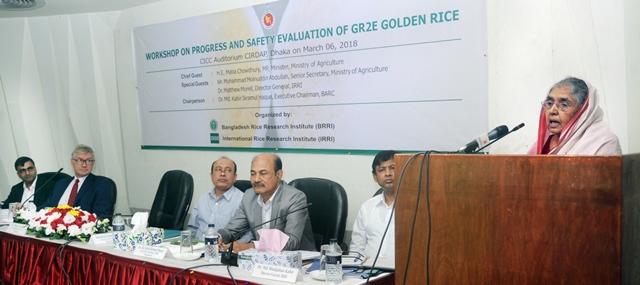Agriculture Minister Matia Chowdhury today acknowledged the positive impact of biotech crops and their potential to help Bangladesh meet the United Nations Sustainable Development Goal of zero hunger by 2030.
Inspired by the success of the country’s first commercially released biotech crop in 2013 – Bt. brinjal – the minister said, Bangladesh is now developing three more crops derived through applications of agro-biotechnology. These are: vitamin-A rich Golden Rice, bollworm resistant Bt. cotton and late blight resistant potato.
Speaking at a stakeholder workshop on Golden Rice at CIRDAP International Conference Centre in Dhaka on Tuesday, Agriculture Minister expressed the government’s firm resolve to support genetically modified crop cultivation in the country.
Matia Chowdhury said, “We do not have enough land for cultivation but have a huge population. What else will we have if people die for the absence of food for the stance on pure foods? We also do not want to struggle from the aristocratic conservativeness that we will not accept, assimilate new technology by breaking our taboo to increase production.”
Bangladesh Rice Research Institute (BRRI) and the International Rice Research Institute (IRRI) organised the daylong workshop where IRRI Director General Dr. Matthew Morell, its Regulatory Affairs and Stewardship Leader Donald MacKenzie, BRRI DG Dr. Md. Shahjahan Kabir, IRRI Bangladesh Representative Dr Humnath Bhandari and senior ministry officials also spoke with Executive Chairman of the Bangladesh Agricultural Research Council Dr. Md. Kabir Ikram-ul Haque in the chair.
During the session key officials and policymakers for agriculture, environment and biosafety were appraised of the latest developments on Golden Rice. IRRI’s regional representative for South Asia, Dr. Nafees Meah, and its Head of Communications Temina Lalani-Shariff were also present, among others.
“Bangladesh has emerged as a global model for combating hunger and obtained great success in becoming a country of food surplus from chronic food shortages. [Now,] we are trying to make our staple nutritionally enriched to build a hunger free and healthier nation,” said BRRI Director General Dr. Md. Shahjahan Kabir.
At present, rice contributes 70 percent of the daily caloric intake of the Bangladesh population, while the national consumption of vitamin-A is estimated at half the recommended daily allowance. Advances such as beta-carotene fortified GR2E Golden Rice are an important part of an overall strategy to reduce vitamin-A deficiency in the country.
Spearheaded by BRRI in Bangladesh and a flagship product of IRRI’s Healthier Rice program, GR2E Golden Rice is the first nutritionally enhanced Genetically Modified (GM) rice to receive regulatory approval for use in food. GR2E Golden Rice recently completed its regulatory application with Food Standards Australia and New Zealand (FSANZ).
IRRI Director General Dr. Matthew Morell affirmed that a robust regulatory landscape is essential to amplify the impact of Golden Rice and other nutritionally fortified rice varieties such as high zinc rice. “FSANZ’s approval process, which ensures the highest standard of health protection, provides a model for decision-making in all countries wishing to reap the benefits of Golden Rice” asserts Morell.
The application for environmental and food safety assessment of GR2-E BRRI dhan29 Golden rice was lodged with the Ministry of Agriculture on November 26 last year and the Ministry of Environment and Forest on December 4 the same year.
Morell adds, “Each regulatory application that Golden Rice completes with national regulatory agencies, including those currently under process in Bangladesh takes us one step closer to bringing Golden Rice to the people who need it the most.”




